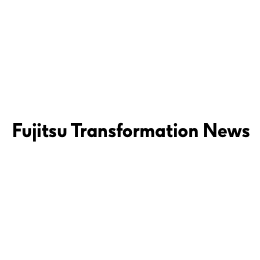In today’s VUCA(*1) era, companies must reform themselves to adapt to a rapidly changing business environment. As we work towards realizing a sustainable world, Japanese companies need to enact management reform from the ground up; DX initiatives, in particular, demand more agile and global responsiveness.
We recently invited Atsushi Kazumi, JSUG Chairman to discuss the importance of management reforms with our EVP CDPO (Chief Data & Process Officer) Shunsuke Baba. Mr.Kazumi is the General Manager of the Business Administration Division and Digital Strategy Division at TRUSCO NAKAYAMA Corporation (abbreviated to TRUSCO NAKAYAMA below), which was selected as a DX brand for three consecutive years.* Mr.Baba oversees our OneERP+ program (abbreviated as OneERP+), which is at the core of Fujitsu’s management reforms. Fujitsu’s Senior Evangelist, Koji Takeda asked them to share their experience about their company’s management reforms.
- *1 VUCA:stands for Volatility, Uncertainty, Complexity, and Ambiguity and helps businesses prepare for uncertain situations.
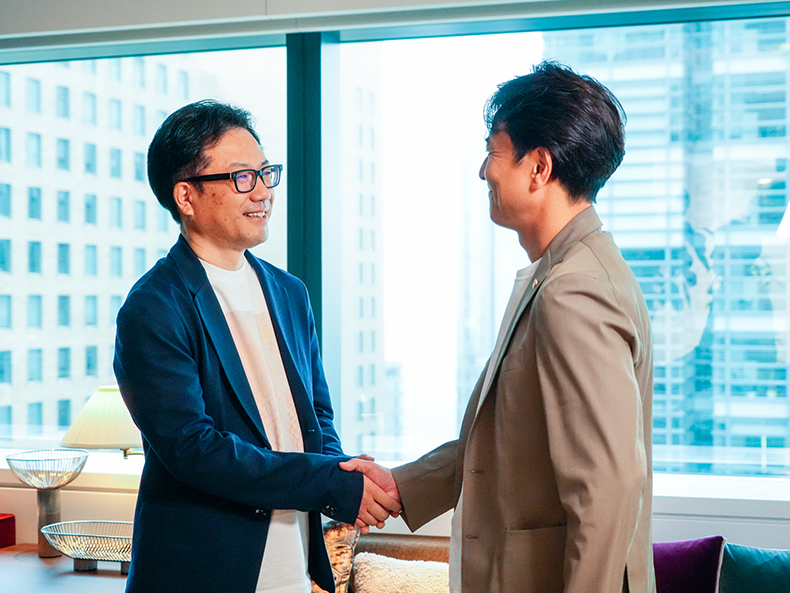
- Table of Contents
Customer satisfaction is the driving force for change
Moderator Takeda: Given that today, companies must reform to survive, I would like to start by asking you to each explain your management reforms from a global management perspective.
Baba: Fujitsu’s raison d’etre has been to build trust in society and create a more sustainable world Since 2020. We made the transition from an IT company into a DX one, and under our OneFujitsu philosophy, launched our company-wide DX Project, Fujitra (Fujitsu Transformation), which promotes management reforms with three pillars: strengthening data-driven management, progression to DX employees, and improved productivity, and all-inclusive ecosystem-based DX promotion. However, we still make management decisions analogously. We face a significant challenge to change these to a data-driven system quickly.
Kazumi: I have been promoting DX at TRUSCO NAKAYAMA since 2017. Nowadays, achieving continued growth at any company requires change. In that context, you need to lead with action that others can then follow—and I believe this isn’t achievable without digital transformation.
Baba: TRUSCO NAKAYAMA is the leader in this field, having been selected as a DX brand for three consecutive years starting in 2020. What was your perception of the issues before that, and what is the current situation?
Kazumi: Our job is very transactional, with a high volume of orders and quotes. When I joined the company, these were taken manually by phone or fax. Seeing a future in which this would inconvenience our customers and hamper our business led to our implementation of SAP in 2006. Looking back, I feel that the growth of our business—doubled sales and 1.3 times increase in full-time employees—is thanks to that business decision to make a significant investment.
Baba: You must have faced unparalleled hurdles connecting that crisis awareness to action. What defining factors helped you to clear them?
Kazumi: The biggest factor was the will of top management to transform the company. Changing the conventional workflow required persuading employees and customers to make changes on-site, which presented a series of challenges that cannot be summed up in a single word. However, we invested the time into providing digital tools for customers to use, and experiencing the convenience and response speeds, which were not possible with analog, empowered our full-time employees to continue with the reforms, something we have been doing for 20 years now. While increasing productivity and business efficiency are essential in digital transformation, customer satisfaction is the ultimate driving force. The fact that this forms the basis for all our activities is why we can keep challenging ourselves, and even when we hit a wall, we push forward with the belief that one day our customers will understand.
Baba: It’s a very empathetic story. The real goal is customer success. I also realize that change is meaningless without customer success, emotional experiences, and added value.
Kazumi: It wasn’t plain sailing for us and it’s still a case of constant trial and error, constantly going back to basics.
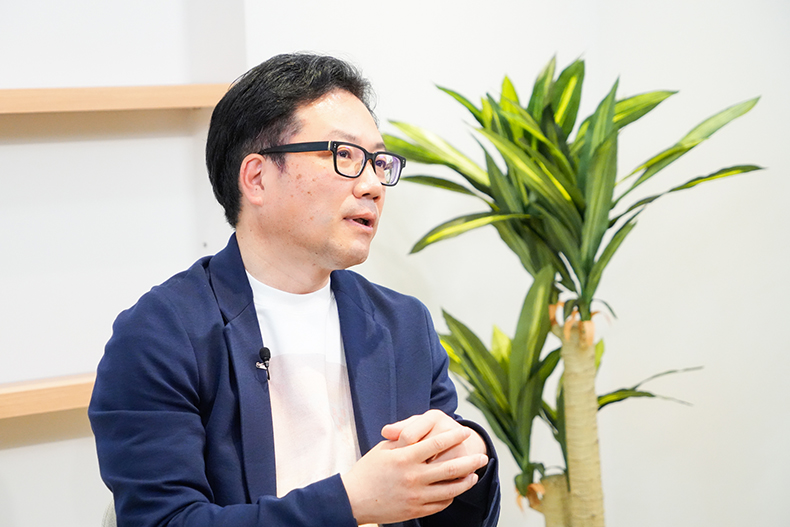 Japan SAP Users’ Group Chairman, Atsushi Kazumi
Japan SAP Users’ Group Chairman, Atsushi Kazumi(Director, General Manager of the Business Management Department and General Manager of the Digital Service Strategy Department at TRUSCO NAKAYAMA Corporation)
Company-wide Initiatives are the Key to DX
Moderator Takeda: Mr. Kazumi, you must visit various companies to discuss business reform. What are your thoughts about corporate issues?
Kazumi: Even though many companies have their top management take the leadership role in driving change, when it comes to DX, the CIO and CEO are often not sure who should lead and how. It’s essential to have a front-line CxO at the helm.
Baba: I agree. In Japanese companies, where there tend to be strong opinions on the frontline, I strongly agree that, as someone on-site, the CxO plays a vital role in building momentum. Mr.Kazumi, how did you overcome the barriers to change on the frontline?
Kazumi: For example, it used to take time to send quotes to customers. Despite offering a reasonable price, actual order rates could have been higher. When we started to use data to respond to customers in real-time, the rate increased, and witnessing this forced us to go digital. I am not saying that the workforce isn’t needed, but rather that a flexible approach that leverages resources differently depending on the business area is essential.
Baba: Wasn’t it a struggle before the transformation became established and effective?
Kazumi: We persevered with the challenge. Having a roadmap at the start to almost certain customer satisfaction was significant.
Baba: I often refer to it as a “winning strategy.” However, no matter how much you can prove an idea digitally, you need solid logic, not guesswork. Are ideas forthcoming from members of the team at TRUSCO NAKAYAMA?
Kazumi: Nowadays, the top does the brainstorming. However, team members go beyond following instructions, adding seasoning and options to tailor ideas for customer satisfaction. We dub it DX2.0, but like Fujitsu’s OneERP+, the entire company should ideally get involved in the transformation, not just one department. Creating the environment to do that is important and the most challenging part.
Baba: What you say is encouraging me. As part of te in cultural change. On the other hand, we are promoting an SAP-centric standardization of core business data. Neither succeeds without the other. The implementation of OneERP+ will take time and require a significant painful review. When only a few people are taking part, the rest are mere bystanders.
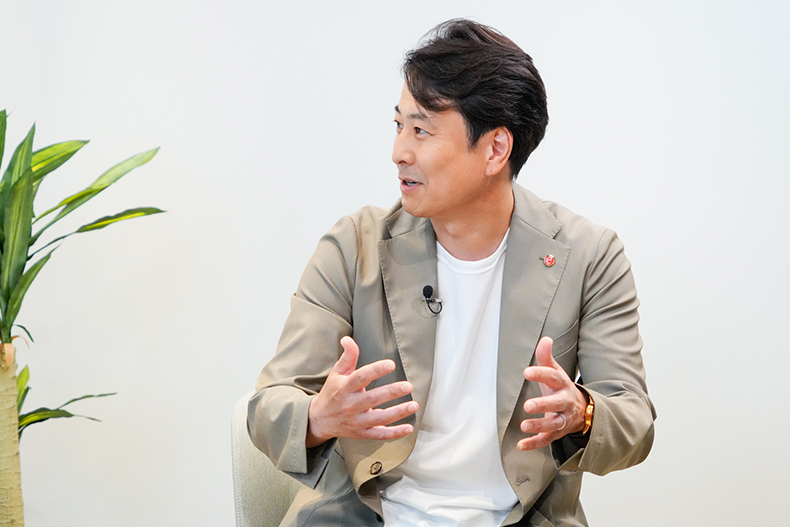 EVP CDPO at Fujitsu Limited, Shunsuke Baba
EVP CDPO at Fujitsu Limited, Shunsuke Baba
How to achieve Fit to Standard
Moderator Takeda: How is progress going with Fujitsu’s OneFujitsu project?
Baba: It has been three years since we decided to standardize all our business globally based on our Fit to Standard concept, yet there is still a way to go. Despite conceptualizing our goals at the start before setting sail, it’s been a bit of an untidy execution. As a result, discussions tend to focus more on the methods and less on the goals. Although we start by returning to the question of the purpose, progress becomes a deliberation of how to align with the reforms, with confusion about the goal in front of us and the end goal. Mr.Kazumi, what, in your opinion, are the key points in promoting business standardization?
Kazumi: Let’s see, the short answer is that it’s not easy. We started in 2020 by asking all our full-time employees in all aspects of the business and all departments what we should do and how. While we expected that many of the individual responses would be less than optimal for and diverge from the company’s overall direction when we began to formulate a vision of the ideal company with members of the reform team, about 700 such requests emerged. Before launching, I think it is essential to listen to the voices on the front lines and try to reach an understanding of the need for the company to standardize in a way that is optimal for the whole company. However, that means talking about it until employees are re-aligned with the company’s vision in that context. While it takes time and effort, this was an important step for us.
Baba: I see. So, to garner constructive opinions, you ask each person to participate as if it were for their own sake. After listening to what you said, Mr.Kazumi, I can see that Fit to Standard is difficult and impossible to achieve without investing effort, wisdom, and time.
Kazumi: Perhaps, fundamentally what is needed is a determination to finish the job.
Baba: And to strengthen that determination, you must have a purpose such as customer satisfaction.
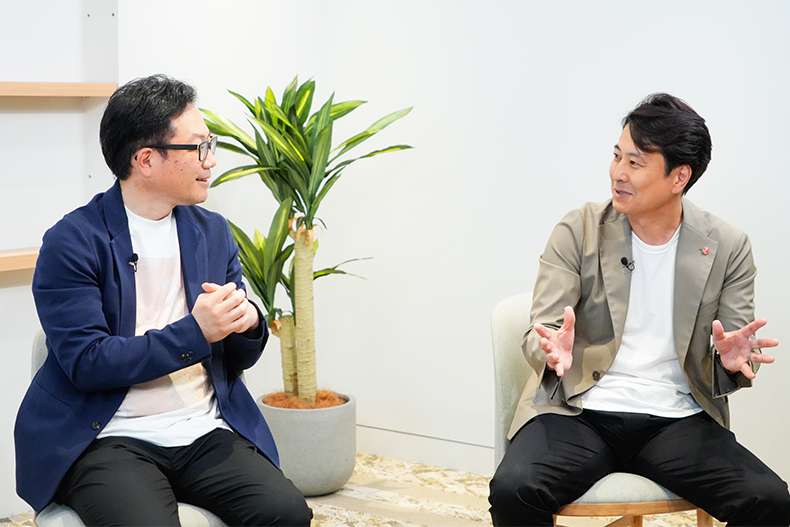
Forging value for Japanese companies on the global stage
Moderator Takeda: In what way do you think Fujitsu’s OneERP+ influences Japanese companies?
Baba: The aim is to provide a reference model for our clients in Japan based on our IT professional services—to become the “First Penguin,” so to speak. We are providing live coverage of our reforms in the hope that more customers will be willing to listen to us when they see things not going well or looking bad. We want to support DX promotion by leveraging our knowledge to create trends that raise the bar in Japan.
Kazumi: I think it’s great for big companies like Fujitsu to be so open about when their operation isn’t going well. I empathize with how you communicate the need for change in real-time. OneERP+ seems to be drawing the attention of many Japanese companies. I think showing Fujitsu’s example will give more and more JSUG member companies the courage to execute similar reforms.
Moderator Takeda: Please share your visions and thoughts about the future direction to head in.
Baba: The DX underway at Fujitsu is just the ticket to global business development. The ticket alone is tough to get, but we must aim higher and determine how to deploy our company’s true values on the international stage. We want to meet the prerequisites for this as soon as possible.
Kazumi: As I stated at the beginning, all companies must reform to continue to grow. Whether from the individual company’s perspective, the industry, or supply chains, we must work together to achieve change. As a foundation, DX is essential, and its implementation will bring sustainability closer. Japanese companies still face many challenges and are often said to be lapping behind. Yet, when switched on and dedicated to the task, they perform overwhelmingly faster than companies outside Japan. Such innovations should be pursued by many Japanese companies, not just Fujitsu.
Baba: Well said. While not quite in our heyday*, we can still really produce a lot of power when switched on. Fujitsu is striving daily to push that switch.
Moderator Takeda: So, finally, what impressions have you gained about one another through today’s conversation?
Baba: I can relate to many aspects of Mr.Kazumi’s belief and vision rooted in his knowledge and experience—the phrase “determination to finish the job” being the most memorable. I want him to continue to lead as JSUG chairman and to work together to realize a sustainable society.
Kazumi: As I think about Fujitsu as a company, the natural way you pursue far greater heights raises my expectations. We appreciate you being able to share various things with us at JSUG and within your own company. Let’s continue to work together on fun, exciting initiatives while assisting the development of companies in Japan.
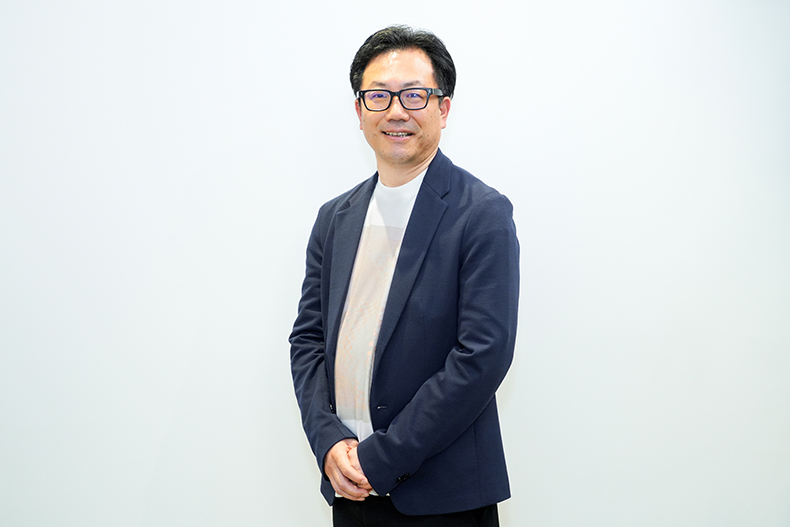
Atsushi Kazumi
Japan SAP Users’ Group Chairman
Director, General Manager of the Business Management Department
and General Manager of the Digital Service Strategy Department
at TRUSCO NAKAYAMA Corporation
Joined TRUSCO NAKAYAMA in 1993 and spent 13 years in a sales-focused roll before becoming Osaka Branch Manager in 2006. After serving as Manager of the Catalog and Media Section and Manager of the e-Business Sales Department, he became Executive Officer and Manager of the Information Systems Department in 2017, leading the Systems Division from 2021 to his current position.
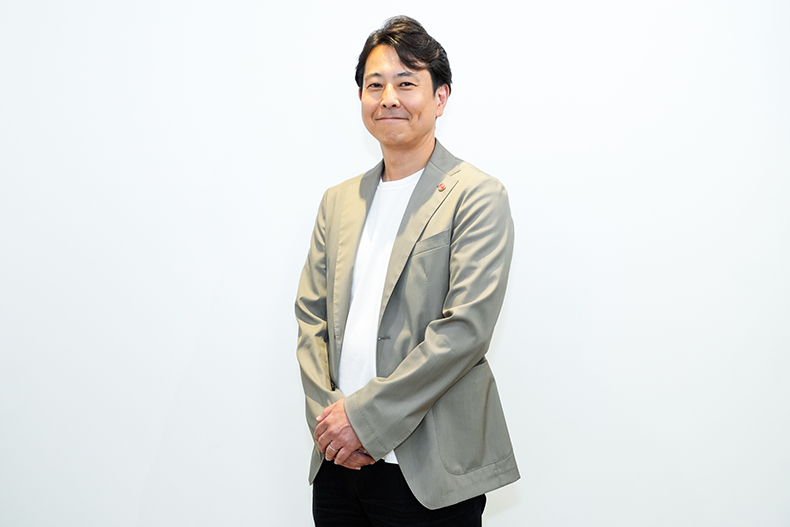
Shunsuke Baba
Corporate Executive Officer
EVP, CDPO (Chief Data & Process Officer) of Fujitsu Limited
Fujitsu Limited
Joined Fujitsu Limited in 1993. Starting with the construction of a bond dealing system, he has consistently worked as a system engineer and project manager in the financial industry and has led the company’s DX reforms as the head of the OneERP+ Program from 2020.
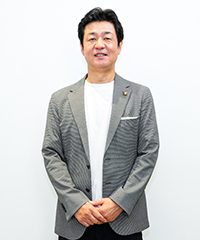
Koji Takeda
Evangelist at Fujitsu Limited


